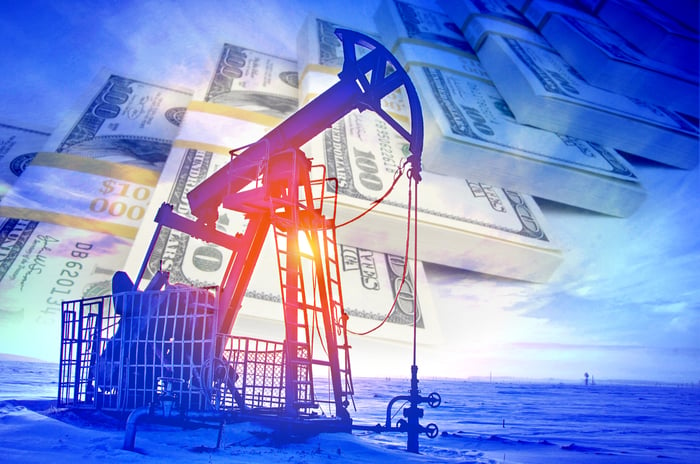When governments shut down their economies last year to slow the spread of the coronavirus, it caused energy demand to fall off a cliff. While demand has steadily recovered as some restrictions have been lifted, it's not yet back to its pre-pandemic level since not all economies have fully reopened. However, the rollout of vaccines should allow governments to open things wide up in the coming months.
That should give energy demand a shot in the arm, boosting the fortunes of energy stocks. Three that our contributors believe could directly benefit from the economic reopening are utility Consolidated Edison (ED 0.63%), refiner Phillips 66 (PSX -2.51%), and oil producer Devon Energy (DVN -0.46%). Here's why they have the most to gain as the economy reopens.
Image source: Getty Images.
Getting back to work
Reuben Gregg Brewer (Consolidated Edison): Consolidated Edison's utility business is focused on the New York City area. That's been a headwind during the coronavirus pandemic because people moved out of the city and, more important, offices and stores were shut down. Basically, people wanted out of the population dense Big Apple in the hope of avoiding getting COVID-19. In the early uncertainty of the crisis, that made a lot of sense and it's reasonable that investors were worried about the impact on Con Ed's business.
ED Dividend Yield data by YCharts
But times have changed and Con Ed's stock is offering up a historically generous 4.1% dividend yield. The big turning point here is the vaccine push currently taking shape across the nation, which should result in more people moving back into cities, and offices and stores reopening for business. Sure, there will be changes like increased remote work, but the upshot for Con Ed is likely to be a return to more normal operations. And that is good news that will eventually flow into the stock price.
Con Ed is, at best, a slow growing utility. But it is a reliable dividend payer, with over four decades of annual dividend hikes under its belt. For conservative income investors it's worth a closer look as the economy starts to reopen.
On the road to recovery
Matt DiLallo (Phillips 66): Pandemic-related economic shutdowns caused demand for refined petroleum products like gasoline, diesel, and jet fuel to crater early last year. While consumption has steadily recovered, it's not yet back to its pre-pandemic level. That has kept the pressure on refining margins, impacting the earnings of refinery operators like Phillips 66.
However, with vaccines rolling out, refined product demand is about to get a booster shot. Increasing mobility should drive higher gasoline consumption as more workers return to their daily office commutes. On top of that, there's a lot of pent-up demand for traveling to see family, take vacations, and hold in-person meetings as Zoom fatigue grows. That should help fuel a rebound in jet fuel. Likewise, economic growth should drive a continued recovery in diesel demand as more goods and products move across the highways.
All this suggests that refining margins should expand in the coming months as inventory levels burn off. That should benefit the refinery business of Phillips 66. Meanwhile, it should also bolster its marketing and specialty operations as it markets gasoline, diesel, and aviation fuel to more than 7,500 locations across the country. Higher demand for fossil fuels will also benefit Phillips 66's midstream operations as it should drive higher volumes across its pipelines. Likewise, its chemicals business should see a positive impact from an improving economy as it should drive increased consumption of the products it produces. Add it all up, and Phillips 66's earnings and cash flow should significantly improve over the coming months.
That should give the refining giant the fuel to resume share repurchases to complement its attractive 4.6%-yielding dividend. Those increased cash returns could help fuel meaningful total returns for Phillips 66's shareholders in the coming months.

Image source: Getty Images.
Earn bigger dividends as the economy reopens
Neha Chamaria (Devon Energy): The reopening of global economies should boost demand for oil, but only companies with financial discipline will be able to make the most of this upcoming cycle. Instead of pumping money into drilling programs, oil companies opting to use incremental incoming cash from rising oil prices to pare down debt or return capital to shareholders should be better placed to weather any volatility. Devon Energy understands this well, even as it sets itself up for solid growth in cash flows this year.
In fact, management is clear about its approach to the rebound in the oil market. Here's what CEO Rick Muncrief said during Devon's fourth-quarter earnings conference call: "We have no intentions of adding any growth projects until demand fundamentals recover, inventory overhangs clear up, and OPEC plus curtailed volumes are effectively absorbed by the world markets."
In line with its views, Devon reiterated its 2021 capital spending budget of $1.6 billion-$1.8 billion when it updated its first-quarter outlook on March 29 despite strong cash flow potential. Devon should be able to generate boatloads of cash this year for two reasons: higher oil prices and contributions from its just-completed merger with WPX Energy.
Management, though, wants to use any additional cash to pare down debt and pay out extra dividends to shareholders under its new variable dividend program. So on top of a fixed dividend, Devon intends to pay out as much as 50% of excess cash flow to shareholders as a variable dividend. That makes Devon an enticing stock for shareholders betting on stronger days ahead for the oil market as the economy reopens.






